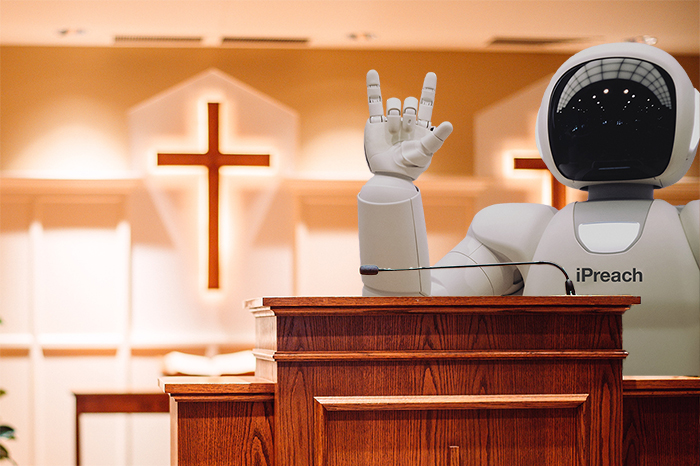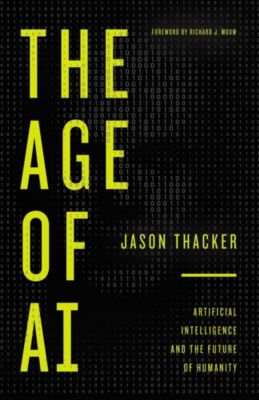
With the expansion of AI, the over-reliance on technology can impact every way we communicate, including the Sunday morning sermon.
By Aaron Earls
In preparing for a typical week’s sermon at his church, Griffin Gulledge turned to an atypical source: artificial intelligence.
Using his normal means of research, the pastor of Madison Baptist Church in Madison, Georgia, had trouble narrowing down the ways the 12 apostles died. So he opened ChatGPT and asked the artificial intelligence (AI) application. “By seeing the ChatGPT answers, I was able to return to my own resources, knowing what to specifically look for to verify its answer,” said Gulledge.
Beyond using artificial intelligence as another possible research or organizational tool, some have championed AI as the future of the faith. Pastors and church leaders should be aware of its potential uses within their churches while remaining diligent toward the ways in which AI can undermine the message being communicated and change us without us even being aware. “We constantly have to ask ourselves: How is technology discipling the perception I have of myself, God, and the world around me?” says Jason Thacker, author of The Age of AI: Artificial Intelligence and the Future of Humanity.
“We constantly have to ask ourselves: How is technology discipling the perception I have of myself, God, and the world around me?” — @jasonthacker Click To TweetAI invasion?
Discussions surrounding the impact of AI on society, including ministry, exploded recently with the public release of ChatGPT in November 2022. But artificial intelligence has been around for decades. The first AI programs were written in 1951 to play chess and checkers. Currently, we interact with artificial intelligence on a regular basis. “No matter where you are, you are being shaped by technology. Even if you aren’t aware of it, you are interacting with AI,” says Thacker.
Our smartphones use it to confirm our identity with facial recognition. Banks employ AI to determine if purchases seem likely to be fraudulent. From social media to online shopping, AI offers recommendations based on past interactions. “The most impact use of AI is behind the scenes,” says Ken Arnold, computer science professor at Calvin University, “empowering automated monitoring and decision-making in areas like law enforcement, finance, and health, as well as in content recommendation and moderation on platforms like Facebook and YouTube.”
Pastors and churches have also been using AI to little fanfare. Numerous software programs congregations and leaders use incorporate aspects of artificial intelligence. A Southern California megachurch recently announced they had begun using AI as part of their security measures. Valley Baptist Church in Bakersfield, California, installed an AI system that monitors video feeds from the megachurch’s campus, scanning for weapons.
Generative AI making Sunday appearances
The generative aspect of recent AI advances is what makes it unique. Traditional AI has been used to analyze data and make predictions based on those inputs. Think Amazon suggesting you buy a new book from an author you’ve read on Kindle. But generative AI, like ChatGPT and others, creates new data based on its training. It can generate images when given prompts and text responses to questions, like identifying benefits and drawbacks for pastors using AI for ministry.
This new generative function has led pastors and religious leaders to turn to AI for more than research assistance. Rabbi Joshua Franklin warned those at the Jewish Center of the Hamptons in East Hampton, New York, “I’m going to plagiarize a sermon. And you have to guess who wrote it.” After the two-minute talk, some guessed his father or a famous rabbi wrote it. When he revealed it was from ChatGPT, some applauded. “You’re clapping, but I’m terrified,” he replied.
The Tablet had the AI app write a Catholic homily on Jesus’s temptation in the wilderness. German evangelicals gathered for a conference in which an entire 40-minute service—music, sermon and prayers—was created by ChatGPT AI with inputs from Jonas Simmerlein, a theologian and philosopher at the University of Vienna.
On the furthest extreme, the Church of AI “is a religion based on the logical assumption that artificial intelligence will obtain God-like powers and will have the ability to determine our destiny.” In preparation for this inevitability, the founders of this new faith are getting a head start on “worshipping AI as a higher power.”
Recognizing limitations
Far from replacing God as the Supreme Being worthy of worship, Arnold says AI can provide benefits for churches, particularly in operations. He notes AI can assist with “helping communications and organization be clearer, understanding the experiences of our neighbors, and empowering the development of custom software and workflows that are fit to the unique needs and mission of each congregation.” He also sees AI as benefiting global Scripture access by “bringing the diversity we have in English-language translation styles to other languages.”
Currently, most Americans see potential benefits coming from artificial intelligence but remain skeptical about using AI for a task that involves personal human interaction or creativity. A Pew Research study found relatively few U.S. adults had heard about how AI is being used. But among those who had heard, most drew a distinction between certain activities. Most thought AI could result in significant advances in certain scientific realms like detecting cancer or producing drought- and heat-resistant crops. For more personal or creative activities—chatbots supporting mental health and writing news articles—Americans were more hesitant to see the benefits. Noteworthy experiments in New York and Germany aside, one would have to assume churchgoers would also not appreciate AI-written messages.
Count Gulledge among those who see limited value in AI as a tool in sermon preparation and would never use it to write his sermon or even assume the generated answers are correct. “ChatGPT can be good as a research aid,” he said, “but any type of ‘ghostwriting’ would be no more ethical than passing off another person’s sermons or commentary as your own work.”
“ChatGPT can be good as a research aid, but any type of ‘ghostwriting’ would be no more ethical than passing off another person’s sermons or commentary as your own work.” — @griffingulledge Click To TweetPutting the intelligence in artificial intelligence
Arnold says he was drawn to the field of AI because he wanted to make computers less difficult to use, to help the machines better understand the people using them. He has both educational experience—degrees from Cornell and MIT as well as a Ph.D. from Harvard focused on AI text prediction—and practical expertise—working with Microsoft, IBM, and NASA. But he also says he wanted to explore what an existing technology, like predictive text, was doing with people.
We often misunderstand AI and think of it in human terms, he says. “When a chatbot says ‘I,’ that symbol doesn’t mean anything like what we mean when we say it.” Unfortunately, our misunderstandings of AI lead to misunderstanding ourselves. We begin to “think of making reasonable responses to prompts as being a primary skill,” Arnold says, “rather than, say, inhabiting relationships, serving others, and being made in God’s image.”
As we grow in dependence on AI, he says it can support a self-centered laziness in us. “When participants in my studies accept lots of suggested words, or people send the complete responses Gmail suggests, some see a successful technology; I’m skeptical,” Arnold writes in a piece on his predictive text work. “Technically, these systems were trained to suggest the least informative text. They were evaluated by whether the writer accepted the suggestion, not whether the result was helpful to the reader. So do these technologies help serve our readers or ourselves?”
With the expansion of generative AI, the over-reliance on technology can impact every way we communicate, including the Sunday morning message.
Science and the sermon
Using technology to study and deliver God’s Word is not a new phenomenon. Internet streaming, podcasting, TV, radio, and microphones have enabled preachers to share sermons with larger audiences spread across larger areas. But even prior to that, Paul used the Roman roads to take the gospel to new cities and preached in the state-of-the-art auditoriums of the day designed to allow more people to hear the speaker.
Tyshawn Gardner, biblical and religious studies professor at Samford University, has been preaching for almost three decades. He has seen technological changes that benefit him in sermon preparation. “Research via technology helps reduce the time it takes me to prepare my sermons and allows me access to a greater number of resources,” he says.
Still, Gardner argues, pastors must guard the sermon prep time. “It is a time that we hear from the Spirit what the Lord wants to say to His church and the world. A message that does not begin with the Holy Presence is not a sermon at all,” he says. “Pastors should be mindful that any curtailing or undermining of the sacred task of preparation is a reproach upon the sacred task of proclamation.”
“Pastors should be mindful that any curtailing or undermining of the sacred task of preparation is a reproach upon the sacred task of proclamation.” — @_TyshawnGardner Click To TweetThacker worries some pastors may be tempted to overly rely on technology, including generative AI, given the ever-growing demands of ministry. To do so, he says, misunderstands the purpose of a sermon. “This is not about the transfer of information,” Thacker says, “but whole person transformation, which can only come after a preacher has been wrestling with God’s Word and is shaped by it himself.”
AI and the Great Commission
Some may argue Christians should use whatever means possible to fulfill the Great Commission. But Thacker says we also have the Great Commandments—love God and love others—as a secondary guardrail for Christian ethics. “We can’t approach technology, or any issue, from a strictly pragmatic perspective,” he says. “The Great Commission doesn’t say we’re supposed to spread information but to teach people to obey what Jesus has commanded us. Teaching involves human connections.”
Gardner says God does not call us to fulfill His purposes apart from His means. “Even God is bound by parameters He has set by His word and actions with humanity,” he says. “We don’t see God using or commanding us to use anything artificial, especially in proclamation. In his Word, the process of biblical preaching is clearly revealed.”
If lacking development by a human being created in the image of God working in concert with the Spirit of God to communicate the Word of God, both technologists and teachers say the sermon would be little more than an instruction manual. When asked what an AI-generated sermon would be missing, Gardner succinctly says, “God.”
For permission to republish this article, contact Marissa Postell Sullivan.












